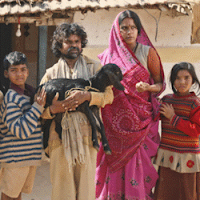The news of Jitu Bagdi’s suicide is what I woke up to today in the morning...the 28-year old sharecropper, a resident of Karotia village in the Burdwan district, poisoned himself to death, unable to payback a loan of Rs. 10,000 (approximately US $ 200), as the crops failed due to scanty rainfall. Five kilometres away, in the village of Basantapur, another suicide was reported a few days ago…Yunus Sheikh another peasant had met with the same fate having failed to repay a loan of Rs. 22,000 (approximately US $ 440). Anusha Rizvi’s Peepli [Live] delves into this grim reality, and commendably so, but despite the sincere efforts, remains somehow detached from the real tragedy. By resorting to the comic mode, it manages to be sporadically entertaining, but the way the narrative is designed is quite predictable. In fact, Rizvi makes too much of the media, and at times, the audience ends up feeling confused whether it’s a lampoon on the media or satire on a major social problem. Actually by taking the satire on the media to an irritating, unbearable extreme, the director often loses focus.
However, the film does have its sunshine moments, thanks to the ensemble cast of non-stars, each of whom delivers power-packed performances. The difficult-to-pacify, half-paralysed, petulant mother who half-rises from her shabby khatia to abuse her daughter-in-law or shout at her good-for-nothing sons and the misfortune they have brought upon the family, is someone you would look forward to as one scene fades into another. The peasant brothers are brilliant too: especially Nattha who turns into a hero overnight having declared that he would commit suicide. The scene where the two brothers fight with fraternal affection against each other as to who would commit suicide is perhaps the most comical of all the scenes, most of the others verging precariously on the slapstick. Little did Nattha know that his life would be transformed in a twinkling of an eye, and all the media attention he gets thereafter makes his life hellish. The government officials, the ministers, the local political leaders are unsparingly satirised, and much of what they do to save the peasants makes for a laughing circus, which, as it goes without saying, does not yield any results. The ending of the film is certainly a telling commentary on how peasants are forced to migrate from the villages in search of asylums in cities, where they are thrust into life-long anguish and pain, no better than the life they have left behind. The poor peasant who quietly drags his loaded bicycle past the media-mela (carrying sacks of soil he digs out from his land), and dies in the end, but does not get any media attention, is another character one may look forward to.
Now friends, a word of caution: Do not rave about Peepli [Live] because everybody is raving about it. If you do not call the film good, your capacity to sympathise with the subaltern would not be called into question. Judge the film from the point-of-view of a film critic and not a social reformer, and you would surely find it wanting. The film is entertaining stuff…and by the virtue (or vice) of being so, the film becomes a typical bourgeoisie take on a serious peasant issue, for both eyes of the business-minded producer (read Aamir Khan) were on the box-office. Yes, the subaltern really cannot speak, and that’s why the bourgeoisie can gleefully sentimentalise on their issues…and when they really speak out…well, our government is already having sleepless nights, no?
P.S: The film may also be judged as a deliberate exercise in lightening the whole issue of peasant suicides for that's what the government has been doing so far. From this point of view, the film may appear a little more appealing.

No comments:
Post a Comment